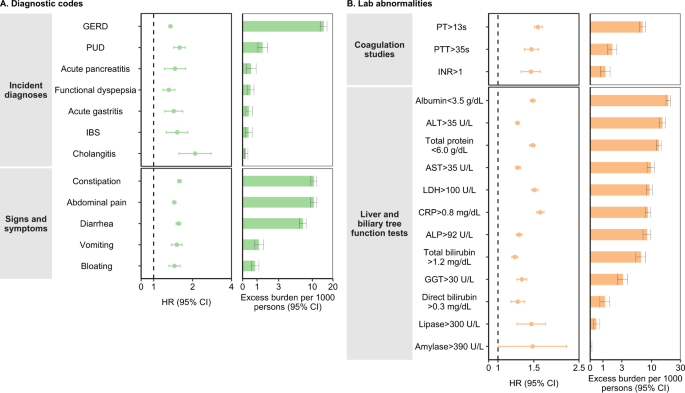感染後のケアには、長引く消化器系の問題に対処することが重要である。 Addressing lingering GI issues critical part of post-infection care
2023-03-07 ワシントン大学セントルイス校
この障害には、肝臓の問題、急性膵炎、過敏性腸症候群、胃酸逆流、胃や十二指腸の粘膜潰瘍が含まれる。COVID-19後のGI管は、便秘、下痢、腹痛、膨満感、嘔吐などを引き起こす傾向がある。
研究者は、これまでのCOVID-19の長期的な影響に関する研究の一環として、GI系に関する発見を発表した。
これまでの研究では、COVID-19感染による80以上の悪影響が認められている。COVID-19感染は、米国で6百万件以上、世界で4,200万件以上の新しいGI障害の原因となっていると研究者は推定している。
研究者は、COVID-19感染後のGI健康を、COVID-19の後期ケアの重要な一部として扱うことが重要であると述べた。
<関連情報>
- https://source.wustl.edu/2023/03/covid-19-infections-raise-risk-of-long-term-gastrointestinal-problems/
- https://www.nature.com/articles/s41467-023-36223-7
COVID-19の長期的な消化器系アウトカムについて(Long-term gastrointestinal outcomes of COVID-19)
Evan Xu,Yan Xie & Ziyad Al-Aly
Nature Communications Published:07 March 2023
DOI:https://doi.org/10.1038/s41467-023-36223-7

Abstract
A comprehensive evaluation of the risks and 1-year burdens of gastrointestinal disorders in the post-acute phase of COVID-19 is needed but is not yet available. Here we use the US Department of Veterans Affairs national health care databases to build a cohort of 154,068 people with COVID-19, 5,638,795 contemporary controls, and 5,859,621 historical controls to estimate the risks and 1-year burdens of a set of pre-specified incident gastrointestinal outcomes. We show that beyond the first 30 days of infection, people with COVID-19 exhibited increased risks and 1-year burdens of incident gastrointestinal disorders spanning several disease categories including motility disorders, acid related disorders (dyspepsia, gastroesophageal reflux disease, peptic ulcer disease), functional intestinal disorders, acute pancreatitis, hepatic and biliary disease. The risks were evident in people who were not hospitalized during the acute phase of COVID-19 and increased in a graded fashion across the severity spectrum of the acute phase of COVID-19 (non-hospitalized, hospitalized, and admitted to intensive care). The risks were consistent in comparisons including the COVID-19 vs the contemporary control group and COVID-19 vs the historical control group as the referent category. Altogether, our results show that people with SARS-CoV-2 infection are at increased risk of gastrointestinal disorders in the post-acute phase of COVID-19. Post-covid care should involve attention to gastrointestinal health and disease.


